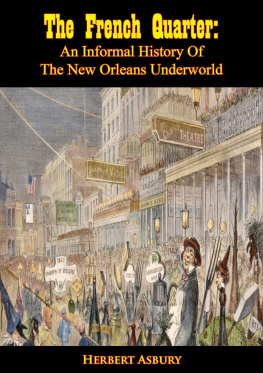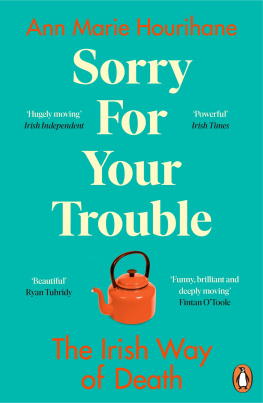
Kristina
Contents
A ll the senior partners were having a laugh about a movie theyd seen. Forty-Five Years. Something, something about the movie taking forty-five years to sit through. The woman McGuinness thought he recognized was into it with them at the far end of the tableleaning in, as if hearing everything for the second time. Miss Nail! they were calling her. What do you say, Miss Nail? Tell us. They were all laughing. He didnt know what it was about.
The woman wasnt tall, but was slender in a brown linen dress, a tailored dress that set off her tan and showed her well-drawn body. Shed glanced past him twicepossibly more. A flickering look asking to be thought accidental, but could be understood as acknowledgment. Shed smiled, then looked away, a smile that said possibly she knew him, or had. So peculiar, he thought, not to remember. Eventually he would.
They were at the Monteleone, the shadowed old afternoon redoubt with the bar that was a carousel. It wasnt crowded. Outside the tall windows on Royal a parade was shoving past. Boom-pa-pa, boom-pa-pa. Then the trumpets not altogether on key. St. Paddys was Tuesday. Now was only Friday.
At his end, the younger associates were talking about contracts for deed. People were getting rich again, they said. Help the banks out, one of them said. The first fish to go ashore. Gut und schlecht. Man would rather will nothingness than not will... Theirs was the old Poydras Street Hibernian firm Coyne, Coyle, Kelly, McGuinness, et al. Friday was the usual after-hours fall-by with the juniors. Give them a chance to find their place, etc. McGuinness was there to be congenial.
The woman had arrived with someone. A Mr. Drown. Someones client whod left. She was drinking too much. Everybody ordered the Sazerac the moment they arrived in New Orleans. The guilty taste of anise. Shed had three or more.
Her eyes passed him again. Another smile. She raised her chin as if to challenge him. The old priest was to her leftFather Fagan in his dog collar. Hed fathered a child, possibly two. Had diverse tastes. His brother was a traffic judge. Why would sex with me be better than with your husband? he heard the woman say. The men all laughedtoo loud. The priest rolled his eyes, shook his head. What did Thomas Merton say... Old Coyne said. The priest put his hand to his brow. Whatre they saying now? someone said where he was sittingone of the young women. Nothing new, was the answer. Coyne thinks hes a priest when what he is is a son of a bitch.
Miss Nail! Miss Nail! What do you say about that ? They were shouting again.
THEY HAD TRAVELED TO ICELAND TOGETHER THIRTY-FIVE YEARS ago (though to be here now was shocking). Both students in Ithaca. Theyd known each other only slightly, which hadnt mattered. A Catholic-school boy from uptown. Her mother, a rich landscape painter living in the Apthorp; her father on a yacht in Hog Bay. Both parents were colorful drunks. Minor exotics.
Theyd first decided on Greece for spring recessagain, knowing little of each other, but ready for an adventure. Mikonos. The limpid water. The little bleached houses you rented for pennies. Each day the natives caught a fish and cooked it for you. However, there was money enough only for Iceland. Their trip wasnt being advertised at home. She was then called Barbara. A name she disliked. He was simply Sandy McGuinness. Alex. A lawyers son. His mother was a school teacher. Nothing about them was exotic.
With their pooled money they took a package flight to Reykjavik and the bus to the far western fjords. Ten hours. Thered be hostels, they believed; friendly Icelanders, wholesome, cheap food, cold Scandinavian sun. But thered been none of that. Not even a room to let. A fisherman who tended a cod-drying rack far out a dirt road, and who spoke little English, offered them a sod house with goats asleep on the roof. Free of charge. Sandy was in love with her before the flight departed.
In the sod house, they slept cold together, talked, smoked cigarettes, sat beside the fjord in what little sun was available. He made unsuccessful efforts to fish, while she warmed her legs and read Neruda on Machu Picchu, Ken Kesey, Sylvia Plath. She told him she had Navajo blood on her fathers side. He was a blacklisted director. Her mother was in essence a courtesan and half-French. About herself, she said she wished to acquire reposethe inner resolve (elusive) shed read about in Fitzgerald. She told him shed loved women.
The fisherman provided them cod, hard soda bread, herring, yeasty homemade beer, blankets, candles, kindling for the March chill. One night he invited them. There was his wife, and two children who spoke English but were shy. The wife scowled at Barbara. They visited only once. They were twenty. It was 1981.
Sandy McGuinness did not know, really, what to think about what he was doing. When they talked, Barbara punctuated her phrases with small, audible intakes of breath, as if these were conversations they neither would forgetthough in his view they didnt seem very important. What he did think was that she was beautiful and intense and unfathomable, but possibly not as smart as he was. Often, as their week idled past, he would see her watching him as he performed his homely duties required to keep them warm and drymoving wood, airing blankets, sweeping. She was assessing him, he knew, as prelude to some decision. He didnt know what needed to be decided about him. And then she told him, unexpectedly, she was intending to stay on after he leftto learn to read the sagas, which she believed would help confer the repose she so badly wanted.
To which Sandy McGuinness thought: Yes. Loving her did not mean more than how he felt at that moment. He would go happily back. Perhaps he would see her again, or not. He was thinking about veterinary school. She could read her sagas. He also felt he could easily marry her.
On their last day, theyd gone into the little town for Sandy to find the bus, after which she was returning to the sod house. Shed arranged to do domestic work for the cod dryers wifea victory, she said. She also saidto him, smiling into the glinting sun, looking luminous and foreign in her big blue sweaterYou know, sweetheart, she said, we dont want anyone else once weve learned who we are. Its a very hard choice to make.
I dont know anything about that, he said. His cheap, black-nylon bag sat beside him at the bus stop. She had the smile. Radiant. Caramel-colored eyes. The shining mahogany hair she dried in the sun. They had made love that morningnot very memorably. She had begun to talk with fewer than the necessary words. As if so much didnt need to be said, and so much was obvious. She was, he felt, pretentious and self-infatuated. Leaving was a fine idea. What hed be missing was miss-able. In the stark light her face bore a coarseness he hadnt noticed, but supposed he would grow to dislike.
Good choices dont make very good stories, she said. Have you noticed that? The sun passed across her eyes, making her squint.
I havent, he said. I thought they did.
Well see each other again, wont we? she said. Well talk about that. Decide if its true.
She kissed him on the cheek, then began making her way purposefully back down the narrow street.
BARBARA HAD NOT COME BACK TO ITHACA. THOUGH HED HEARD things. That she had changed her name from Barbara to Alix and entered divinity school at Harvard. That she had been for a period an artists model. That she had been illmysteriously. TB, possibly. That she had married a doctor and lived in New York City. They were all plausible futures for her. Nothing was mentioned about the sagas. He was starting law school in Chicago and meant after that to move home to practice. The foreignness hed likedconceivably, briefly lovedcould take its place in the routine of memory. The place in his life she occupied Iceland, he privately called ithad evolved to be a good story he told. A trip hed once taken with a girl.
Next page
















